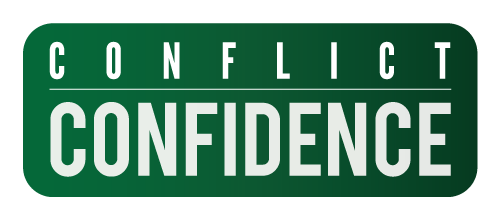On October 30-31 in Indianapolis, IN we will be offering a workshop open to the public titled, Conflict Confidence (details and registration here).

Today I am interviewing Guy Harris, designer and facilitator of this workshop, my co-author on From Bud to Boss, and a Master Trainer at the Kevin Eikenberry Group.
Kevin: The title of the workshop is Conflict Confidence. Why the focus on confidence rather than strictly on resolution?
Guy: You know, Kevin, early in my professional development, I began to read articles, papers, blog posts and books about and I attended workshops on leadership, communication skills, and conflict resolution. I have practiced the skills I learned in that process, and I have discussed what I learned with literally hundreds of people to get different perspectives and viewpoints. And from all of that, I have learned a great deal about conflict resolution. I have learned lots of tips, tricks, techniques, and strategies for dealing with conflict more successfully, and I learned that the biggest barrier to successfully resolving conflict was having the confidence to confront difficult situations and to speak assertively in uncomfortable situations.
Initially, building my skills helped me to develop my confidence to a certain degree, and I was still pretty nervous about conflict situations. As I have worked on developing conflict resolution skills, I have also looked at my experiences in many situations. From this reflection process, I realized that the biggest barrier, for me, to successfully resolve conflicts has been more connected to my mindset than to my skill set. While I have seen that skill set is important – you really do need to develop some high-level communication skills to resolve conflicts well – I have found that how you think about conflict affects your ability to resolve it as much – if not more than – your technical skills of communicating during the conflict. So, I focus on conflict confidence so that people develop both their ability to interact successfully from a technical standpoint and to develop the mindset and confidence that helps them to initiate the actions they have learned when the situation gets difficult.
Kevin: Mindset and skill set – a very powerful combination! Well said! Do you think that everyone needs to develop confidence in their ability to successfully resolve conflicts?
Guy: Yes, I think so. I think that different people will have different challenges to overcome as they work to develop conflict confidence, and I believe that everyone can develop it. And I think this because the confidence comes from knowing that you have the skills to communicate in a difficult situation, and you have the ability to diagnose the situation accurately as you choose the best strategy for the situation. Since both of these things can be learned, I think that everyone can learn them.
Kevin: And that is exactly why we built this workshop! What are some of the different challenges people might face in developing conflict confidence?
Guy: Well, the most obvious is the challenge that a relatively quiet person who really values relationships might face. For people with this perspective, addressing conflict can feel like a fight, and they don’t generally like to fight. So, the words “confrontation” and “assertiveness” can sound to them like “anger” and “aggression.” For them, the confidence struggle they often face is in their own ability to confront a situation without hurting people. As a result, they will have to overcome this feeling in order to develop true confidence in their ability to engage in a conflict conversation without destroying the relationship.
And people who have a very bottom-line, just-the-facts type of perspective can face a different challenge. People who have this perspective are often very comfortable with confrontation and speaking directly, and they can feel challenged when they need to stop to listen to the other person. Slowing down, listening, and considering the relationship impact of a communication can feel like “losing” to them. This feeling of “losing” is often related to a sense that the conflict resolution process will slow down their accomplishment of results. So, the confidence struggle they face is usually confidence with the process rather than confidence with themselves. As a result, they often need to overcome this feeling of losing to develop confidence that the conflict resolution process will get results.
Kevin: So, let’s assume that people develop confidence in their ability to address conflicts. Does that mean that that every conflict can and should be resolved?
Guy: Actually, no, I don’t think so. There are times when the emotional – and sometimes financial – costs of resolution actually outweigh the benefits of resolution. And, there are times when one of the parties simply will not cooperate with the process no matter how well you execute the strategies of conflict resolution. In either of these cases – extremely high cost or a totally unwilling participant – the conflict will not likely be resolved.
That being said, I think many people give up on the process far too soon. I see many people throw up their hands and give up at the first sign of significant difficulty or resistance from the other person. Part of developing conflict confidence comes from building confidence in the tools and the process to ultimately lead to a successful resolution and a willingness to engage in the process long enough to let it work. While I accept that some conflicts will not be resolved, I suggest stepping into rather than away from and thinking openly rather than judgmentally about conflict situations so that we can build stronger, more productive organizations where conflicts become constructive parts of team growth rather than destructive elements that drive us apart.
Kevin: Thanks Guy for some great insights and food for thought. If these ideas resonate with you and your organization, we’d love to have you join us in Indy Oct 30-31. (learn more here). Or if you are interested in bringing the workshop in-house or having us customize some highly effective training for you, contact Barb (317-387-1424 x4) and she can help facilitate that as well.


I totally agree. So many people avoid any attempt to work through the conflict , in fact 75% in a survey we conducted amongst people in Australia. Teaching skills is important but the confidence issue must be addressed or the skills will rarely be used.
Thanks for sharing great information. i believe the harder the conflict the more glorious the triumph.